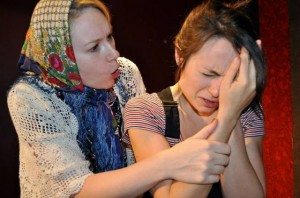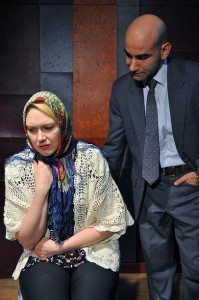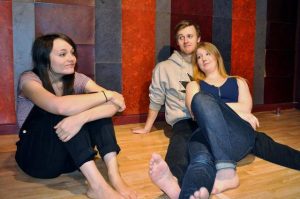

On Wednesday night I had the pleasure of sitting down with a few of the women behind About Face, a new immigrant drama on stage at Williamsburg's The Brick. I spoke with playwright Essie Martsinkovsky, director Anna Strasser, and actress Charity Schubert, who plays the role of Zina, a woman who emigrates from the Soviet Union in her seventies, and finds herself grappling with the horrors of war lurking in her past, and what it means to be a stranger in a strange land so late in life.
The easy respect and collaboration that flows between them was immediately apparent, and is no doubt the backbone that led to such a powerful end product. Read on to hear all about grandmothers, the KGB, and how to nail a Russian accent.
First, Essie, can you talk a little bit about what inspired you in the very beginning? And maybe, Anna and Charity, you two could talk about how you eventually found the project and came to collaborate?
Essie Martsinkovsky: How long can I talk? So I actually started the play when I was living in Singapore, and it was actually right after my grandma died...
Anna Strasser: Her grandma Zina.
Essie: I changed a lot, but I didn’t change some things. I also was very homesick for America because I was living in Singapore for two years. I thought about America all the time when I was there in ways I hadn’t thought about before, cause I had always lived here. And in Singapore I was seeing it as this like mythical place, which is kind of how I always saw Russia because my parents are from there, my whole family is from there, but I was – I never really spent any time there. So it was just kind of interesting to have both of these kinds of homelands. To be far away from both of my homelands and to see them as these abstract places. I just wanted to play with that - and I was thinking about my grandma - so I guess those are the ingredients that I kind of came into it with.
I think, even if you can’t speak directly to the immigrant experience -- you aren’t first generation -- I think that everyone can relate in some way to generational relationships and differences on display between Zina and Lina (her granddaughter). Can all of you talk about how you brought some of your own experiences to working on this project? Essie, you have a grandma Zina…
Essie: But she wasn’t like Zina at all... you’re asking how personal relationships with our families factored into creating the play?

Well, I guess you could say I’m curious how true to life this is.
Essie: I think it’s somewhat true. I mean, I think it’s a bit of a generalized portrait of Russian immigrants, so you know, I’m plucking from things I’ve seen from my friend’s families, it’s not all in my family. But definitely like, most Russian families -- immigrant families -- come equipped with a 'Babushka' [grandmother] (laughs). And sometimes a 'dedushka' too -- a grandfather. Um, cause usually you know, all three generations would come to America together and the grandparents would have a big role in the raising of their grandkids. And I also feel like in America there’s more of a notion of like, independence, but in Russian families, they’re in your face all the time. And maybe in America, they are too, but I don’t know…
Anna: Jewish families, they definitely are.
Essie: But like, my grandma worried a lot, she worried about everything, she always though I was getting sick, like always. And I think it’s partly because they lived through really horrible things, so it was kind of like a national disposition maybe.
Charity Schubert: For me, [I'm] not the child of immigrants, but my grandmother on my father’s side grew up the daughter of tenant hall farmers in rural Illinois of German descent, her parents didn’t speak English, they spoke only German. And she had a very hard, difficult life and upbringing, farm work, poverty, basically barefoot in the summers every summer, and for my family the journey that we’ve gone on is kind of amazing in that I’ve gone to college and am now living in New York City and pursuing a career as an actress. I have this insane, impossible dream that I have the luxury of pursuing, basically the level of luxury that I have that she can’t really comprehend. She is supportive and loving, but I know that she had no idea why I wanted to move to New York, and when I told her I wanted to be an actress, her reaction was, “you don't want to kiss all those men!” She was very loving, helped raise me, but there was also the Catholic guilt and manipulation so I can definitely relate to that, that crosses cultural borders very well. So I just used, I tried to step inside her shoes and imagine what she sees when she sees me, you know, female, unmarried, no real desire for children at this point, which is completely foreign to her and her world and what that must mean to her. And yet, that intense, deep love that she still has for me. She just turned 91. She’s pretty awesome. So that’s kind of my personal experience that I tried to look at our relationship through her eyes.
You gave such a powerful performance, it’s really cool to know that you were pulling from something that’s -- in a way -- so close to that sort of structure.
Charity: There are some things that are kind of universal. There are some elements in there - that grandmother/granddaughter bond that crosses all kinds of lines.
Anna: I sort of have a different, personal... I mean I guess I’ve had lots of different Jewish ladies in my life (laughs). I guess my sort of personal relationship to the play is more from the point of view of the outsider. I grew up in Hong Kong, so sort of similar to Essie of feeling like America was this mythical place, like I knew I was American, obviously I’m a blonde white girl, but I sort of was like, “oh, I’m American!” I’m in Hong Kong, I’m part of a minority, that’s cool, I’m gonna live my life. But so I moved back to America and I was among all of these people who look like me and sort of were like me theoretically, but who I could not identify with at all, and I kept being like, “I wanna go home!” And my mom was like, “sorry kid, you’re home.” So it was this weird sense of -- theoretically I knew I was American, but when I got to America I thought, this isn’t it, this isn’t who I am. Figuring out where home was and feeling sort of homeless in this way that theoretically you knew what home way, but it didn’t feel like home. And I think that both Lina and Zina sort of deal with that in their own ways in the play, and that was sort of my connection more than the grandma, granddaughter thing.
There’s so much Russian in the play, like actual Russian. When you first start watching it, it’s shocking because there aren’t convenient subtitles to read, you have to just kind of go with it, so from your perspective [Essie], I’m curious about your decision not to help out the audience so much and to include as much Russian as you did, and then [to Charity] I was so wondering if you were going to have a Russian accent. Do you have experience speaking Russian?
(Laughter from all three)
Anna: Not really.
Charity: Not a word.
Wow, okay.
Charity: I knew da and niet. That was it. Not a word.
Anna: She’s a rock star.

Did you have coaches?
Charity: I had Essie, I had Sergey [Nagorny, the actor who plays both the KGB agent and Boris], who was very patient and wonderful with me. Actually at my day job I work with a fairly large number of Russian Jews.
Your life was just meant for this role.
Charity: It really was, I think so. So I was bothering Lydia and I was bothering Nadia all the time, and I also had YouTube, another great resource. I would find native speakers on there, and I started watching children’s cartoons, Peppa The Pig, so I pulled from a lot different sources, but the main help obviously came from Essie and Sergey.
Essie: I was like, “Charity, come here. We’re gonna have some coaching.”
Charity: It was definitely a challenge, but I love a challenge, I love doing something hard, and I learned so much about the culture, the language, the history, that it has been completely worth it.
Essie, do you speak Russian?
Essie: Yeah, I do. You know, it’s funny that you say there’s a lot of Russian, because from my perspective there’s like hardly any Russian compared to what there used to be, because initially all of the conversations between the grandma and the KGB man were in Russian. I was like “oh, we can do subtitles!” And then we kind of decided that for this show and our timescale it would be a little... And with, you know, not knowing that many Russian actors it would just be too complicated. So we basically translated it to English and then kept a few Russian bits that were, um, kind of, not throw-away, but that -- they could be disorienting, but they didn’t fundamentally alter your understanding of the plot. So I can say that nobody missed anything important. Yeah.
Anna: Essie basically... I don’t speak a lick of Russian, I gotta tell you. And Essie emailed me the script, and she sent me an English version and a Russian version. And I was like “So we’re doing the English version?” And she was like, “No we’re doing the Russian version.” And I was like “No we’re doing the English version.” (Laughter) And it was sort of a marriage of the two. And having the KGB speaking Russian, but Zina responding in English, we sort of felt that you got the conversation without. From the response.
Essie: And I think it’s interesting to play with throwing things at the audience that they can figure out but that they don’t understand immediately. And I think you have to walk the line between not throwing too much of it at them. But I think with a little bit, it can work.
And it parallels the disorientation that the grandma feels, so it’s really interesting to draw the audience that way.... A lot of the play is grounded in a linear narrative of sorts, but a lot of it is surreal. So much that's happening -- it could be two scenes at once that somehow intertwine for example. As a director, Anna, how did you decide to depict that?
Anna: Well I wanted a world that was grounded in something. I wanted there to be a reality of this world, but to allow this sort of fluidity into their imaginary friends and their demon angels and what's haunting them. So I wanted you to feel like you knew that it wasn't a here and now moment, but the line wasn't quite clear, like all of a sudden Boris is there, but oh, she's at the campfire but her dead husband from the 1950s is also here and so it's like allowing these worlds to sort of roll around each other. I didn't want it to be cut and dry. Everyone has their demons and their angels, and you're playing hockey by yourself with a broom and in socks, imagining you're a superhero, and all of a sudden your grandma walks in. Allowing those worlds to just exist.
Charity: A lot of times the actors would say, "Ok, are we in A or are we in B?" And she'd say, "both!"
Anna: It's about hoping you're creating an open enough space where people will just go with you where you're taking them.
Charity: And for me those scenes, like in the hospital, were very real, because what's in your mind is your reality.

This struck me as I was watching, because it's a play largely about women, and close, personal relationships between women, but I was shocked at the motif of violence that kept popping up, from the wrist breaking joke at the beginning to a huge gun being pulled at the end. Is this something you consciously included, Essie, and how that plays into your perception of Russian/American relations? And as an actress, Charity, did that have an emotional impact on your performance?
Essie: Yeah, I think all national myths have an element of violence to them, like nationalism is sort of inherently violent to me. Hmm... let me think on this, somebody else talk.
Charity: For me it goes back to Zina's line, "I'm from Soviet Union, I've seen everything." Tying into the reality that, if her husband was taken in by the KGB during that time, Stalin's order to get the confessions out of the doctors was to "beat, beat, beat and beat again." So even if she got to him early on, he probably would have come home black and blue and bloody, and she probably did see a lot of violence. And she knew people who came from violent places, and having had friends who grew up in places where one of your first memories is of having a soldier's rifle pointed in your face, I know that it becomes deeply rooted as a part of you. So it was her reality, and she had seen that. So it also helped me play with, if she comes to America, she says, "it's hard to get accustomed to all this, you could call it 'freedom.' everywhere you look". Violence was a part of when she game through customs.
Anna: And I think on the flip side, if you look at Lina, who's had the benefit of living a relatively easy life, that she almost has this survivor's guilt about her. And she has this sense of wanting to prove something, and that's why when she gets in with Felicity and John and they're like these challenging people who are like, will you prove yourself? Yes I will! Will you die? Yes I will! because she wants this sense of belonging and proving that she exists somewhere. Because of her security, she might go the other way. Because of the safety she's had, she wants to live on the edge.
Essie: I also think in American pop culture there's a lot, a lot of violence. I mean if you just look at any action movie, how many guns get pulled and like, that's something I also wanted to play with, that Lina has, on one hand, her background of her Grandma with the wars, and WWII, and the communists, and even being a doctor without any oppressive regimes is still violent, and you see people die all the time. And on the other hand, she knows her grandma comes from that, at the same time her grandma desperately wants to shield her from that, so she's coddled and protected, and in this country where she's growing up, violence is -- it's not glorified kind of on an every day level, but it's in the media, everywhere, so it's kind of around.
Well, you've all completely overindulged me! Anything else you'd like to say to our readers?
All three: Come see it!
Charity: For me, it's been an honor to tell this woman's story, and in doing this role I did a lot of research into the history of Russian Jews and the oppression and trying to leave for Israel or America. And it's been a great honor to tell this story that I knew nothing about, I knew nothing about this entire, massive phenomenon that took place, and educate myself and educate other people.
Essie: And on that, I also want to say that I got this opportunity through a grant for Russian Jewish adults between 25 and 40. So I saw this as an opportunity to tell the story of the people that I come from, because I've never done that before. So on the flipside [to Charity] it was an honor to have someone who didn't know that story. Nobody on the team besides Sergei, who's Russian, really knew the background, and it was an honor to be able to create this project, bring people into the story, hopefully share it with many more people, and keep history alive.
"About Face" is on stage at The Brick Theater through Sunday, December 21st.